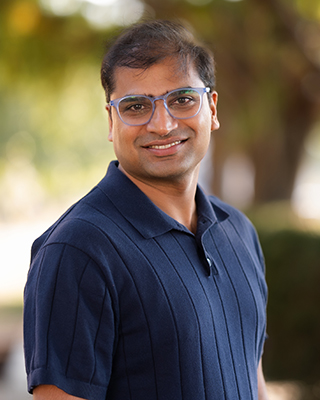Oct 23, 2025
Allu brings award-winning data analytics experience to Gies

Rakesh Allu brings early career recognition from stops at both Deloitte and HSBC to his role as assistant professor of business administration at Gies College of Business.
Despite that recognition, he realized that to effectively answer the questions chief experience officers (CXOs) were asking, he needed to upskill himself.
“As I saw it, there were two ways to upskill,” Allu said. “The first is to manage large teams, and the other is to achieve more technical skills, which is the path that I decided was the best for me.”
In the summer of 2019, he left the industry full-time to pursue a PhD at Cornell University and fell in love with the academic side.
“I chose operations for my PhD because it was a good mix of business and mathematical thinking and ultimately operations management, which is a blend of both technical skills and managerial relevance.”
In addition to completing his PhD in the spring, Allu earned the 2025 Industry Studies Association Ralph Gomory Best Industry Paper Award for his study, “Technology-Enabled Agent Choice and Uptake of Social Assistance Programs: Evidence from India’s Food Security Program,” published in Manufacturing & Service Operations Management.
At Cornell, his research centered on digital platforms and social sustainability. He is especially interested in how emerging technology can be used to improve the processes of government. Allu discovered that most existing frameworks in business schools are not easily translatable to governmental settings, which enhanced his excitement about studying these contexts.
“Technology is rapidly evolving,” Allu said. “Usually, we find that the way private companies adopt these emerging technologies is not exactly the way governments should, because their missions are entirely different. Unlike those companies, governments are not thinking about these technologies in terms of efficiency and profit; instead, their lens is on reach and fairness.”
Allu also has an interest in digital platforms.
“They are everywhere, so it is hard not to notice the prevalence of these platforms,” he said. “We may think it is easy to match two sides of the market because everything is at our fingertips, but it’s actually not that easy. In reality, there is a lot of backend mathematical machinery going on behind a simple recommendation for an app. That mathematical sophistication fascinates me.”
He is also interested in sharing his real-world industry experience.
“I have been a data scientist in over a half dozen companies, either directly as an employee or as one of their consultants,” Allu noted. “I have walked across both rooms. I have presented data across both rooms. The Cornell students have shared they love it when I share these experiences, and I am hoping students at Gies Business will as well.
“It’s not sufficient just to be a good analyst anymore; you have to bring the humans into data,” Allu added. “Previously, anyone who could analyze data was in demand in the marketplace, and companies were paying a lot of money to hire them. Going forward, AI is going to analyze the data for you, but those who can bring humans into the data will be the ones in high demand. I hope to show some of these use cases and examples in the classroom.”
One of those examples he shared is that in the future, security may only need to recognize your thumbprint as your identity; however, for those living below the poverty line who have done manual labor for decades, their thumbprints may have eroded.
“That is bringing the human element into the technology,” Allu said. “As technology evolves, we need to make sure the underprivileged are not left out. AI will not tell you this. You must take that human lens and marry that with technology.”
